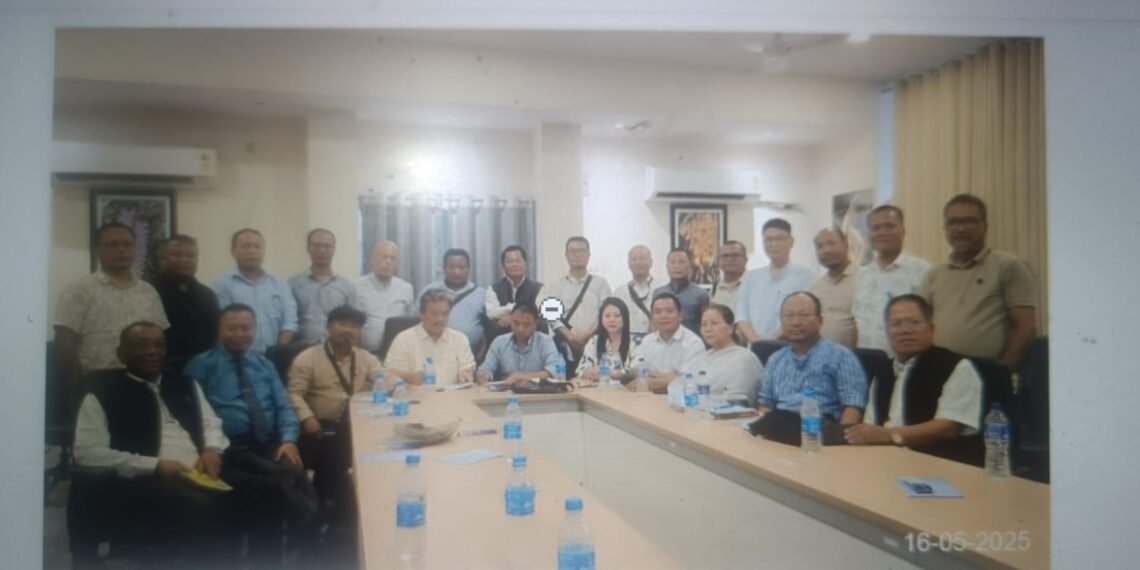After years of stalled negotiations and unmet promises, the Kuki-Zo leadership has drawn a line in the sand. Their message to the Centre is unambiguous: no more dialogue until the core demand for a Union Territory is taken seriously.
BY Navin Upadhyay
May 17, 2025
A day after the Kuki-Zo leadership announced a suspension of talks with the Centre, fresh details from inside the Guwahati conclave reveal deepening frustration and growing distrust toward the Government of India’s handling of the Manipur crisis—two years after the ethnic violence of May 3, 2023, that left over 260 dead and more than 60,000 homeless.
The joint declaration, issued on May 16 by Kuki-Zo MLAs, leaders of civil society organizations (CSOs), and representatives of armed groups under the Suspension of Operations (SoO) pact, marked a decisive turning point in the community’s engagement with the Centre. The leadership has now resolved not to hold any further talks with the Government of India or its representatives until meaningful dialogue with the SoO is resumed, particularly over the demand for a separate Union Territory.
“This is not a symbolic gesture; it’s a firm political stand,” Dr. Seilen Haokip, spokesperson for the Kuki National Organisation (KNO), told Power Corridors a day after the closed-door conclave. “For two years, there’s been no accountability for the 2023 violence, no progress toward justice, and no action on our political aspirations.”
The Guwahati meeting was triggered by a series of setbacks that eroded trust in the Centre’s approach. The Suspension of Operations (SoO) agreement, signed in 2008 to bring peace through ceasefire and dialogue, has yielded little progress on the Kuki-Zo demand for a Union Territory under Article 239A. A recent attempt at inter-community dialogue, facilitated by the Ministry of Home Affairs on April 5, 2025, in Delhi, ended inconclusively. Kuki-Zo leaders criticized the talks for sidelining their political demands.
The lack of accountability for the 2023 violence, allegedly perpetrated under the patronage of state government , has intensified distrust. Meanwhile, basic infrastructure needs, like a long-demanded road connecting Lamka (Churachandpur) and Kangpokpi, remain unmet, forcing the community to fund and build it themselves—a move a Kuki observer called “an affront to tribal dignity.”
The Guwahati conclave followed a flurry of preparatory meetings. On May 12, the Kuki-Zo Council, SoO groups, and civil society organizations met in Kangpokpi to unify their stance. A day later, the Kuki-Zo Council’s Governing Council convened in Churachandpur to discuss governance under President’s Rule, imposed since February 13, 2025, after Chief Minister N. Biren Singh’s resignation. These discussions underscored the urgency of the May 16 summit, where leaders sought to reassert their push for a separate administration.
ALSO READ: Kuki Village Body Alleges Violation of Customary Land Boundaries
The meeting brought together prominent figures, including BJP MLAs Nemcha Kipgen, Letpao Haokip, Paolienlal Haokip, and LM Khaute, alongside a delegate for Vungzagin Valte, a survivor of a 2023 mob attack. Tribal civil society organizations—Kuki Inpi Manipur, Zomi Council, Hmar Inpi, and Kuki-Zo Council—joined representatives of SoO signatories, including the KNO and United People’s Front (UPF), in endorsing the resolution to halt talks.
Leaders criticized the Centre’s inter-community dialogue as a tactic to delay their core demand for a separate administration. “These discussions are a distraction, diluting our political aspirations,” a senior Kuki leader said. “Without addressing structural injustices, peace is unattainable.”
Kuki-Zo Leaders Suspend Further Dialogue with Centre#KukiZoUnity#ManipurCrisis #GuwahatiDeclaration #PoliticalDialogueNow #JusticeForTribes
https://t.co/ZuEoeb1ne2— POWER CORRIDORS (@power_corridors) May 16, 2025
Dr. Seilen echoed the sentiment, noting, “The Home Ministry is under pressure from Meitei groups. No one has been punished for the 2023 violence, and even basic needs are ignored.”
Dr. Seilen also lamented that the Government of India has done nothing to even address the humanitarian crisis the Kuki-Zo people face. “We have demanded a road between Lamka (Churachandpur) and Kangpokpi for ages, but nothing has been done. We are now forced to build the road ourselves by raising our own resources and using our own manpower. Is it not shameful disregard to the tribal populace of Manipur?” he said. “How long could the Meiteis keep diverting all the resources for Imphal and expect us to remain silent?”
Community elders raised alarms over growing unrest among tribal youth, warning that delayed justice and a stalled political process could spark further instability. “Patience is running thin,” one participant said. “Frustration could soon spiral.”
The 2008 SoO agreement, signed between the Centre, Manipur government, and the KNO and UPF, representing 25 armed tribal factions, aimed to integrate insurgents into the political mainstream. Despite multiple rounds of talks, the Centre has made no concrete progress on the Kuki-Zo’s demand for a Union Territory, central to their vision of security and self-governance.
The Guwahati declaration signals a potential breaking point. With tensions simmering and public patience fraying, the Centre faces mounting pressure to act decisively—or risk further escalation.














